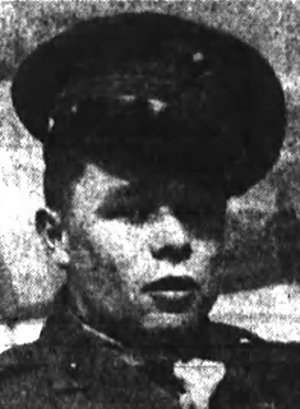Gerald Meaden Butland

Private Gerald M. Butland served with Able Company, First Battalion, 7th Marines.
He was killed in action at Guadalcanal, Solomon Islands, on 27 September 1942.
Branch
Marine Corps Reserve
Service Number 351363
Current Status
Remains Not Recovered
Pursuit Category
The DPAA has not publicized this information.
Capsule History
Pre-War Life
Birth
October 24, 1920
at Brigus, Newfoundland, Canada
Parents
George Duncan Butland (d. 1941)
Louisa Parker (Meaden) Butland
Education
Poughkeepsie High School (1941)
Occupation & Employer
Central Hudson Gas & Electric
Service Life
Entered Service*
January 6, 1942
at New York, NY
Home Of Record
13 Eighmie Terrace
Poughkeepsie, NY
Next Of Kin
Mother, Mrs. Louisa Butland
Military Specialty
—
Primary Unit
A/1/7th Marines
*Military records routinely misspell Gerald's name as "Gerard"
Campaigns Served
Solomon Islands / Guadalcanal
Individual Decorations
Purple Heart
Additional Service Details
—
Loss And Burial
Circumstances Of Loss
On 27 September 1942, a detachment of the First Battalion, 7th Marines under the command of Major Otho L. Rogers made an amphibious landing on the beach just west of Point Cruz, Guadalcanal. This complicated maneuver was a bold attempt to flank Japanese defensive positions along the Matanikau River, establish a foothold in enemy territory, and allow other Marines to force their way across – possibly turning the tide of battle along Guadalcanal’s northern coast.
Rogers’ men landed without incident and advanced inland to a grassy ridge designated “Hill 84.” The plan quickly fell apart: fast-moving Japanese troops counterattacked, and a mortar shell killed Rogers as he tried to establish a perimeter. With few heavy weapons and no radio, the Marines fought their way back to the beach, suffering heavy casualties all the while. Brave Coast Guardsmen arrived in landing craft to extract the battalion. The ignominy of withdrawal was not lost on the Marines, who bitterly nicknamed the battle “Little Dunkirk.”
Private Gerald Butland was one of thirteen Marines from A/1/7 to lose his life on 27 September. He was last seen alive on the retreat route, in heavy jungle near the beach.

Burial Information or Disposition
The Marines, hard-pressed to evacuate their wounded, were forced to leave the bodies of the fallen on the field. “Not recovered due to battle conditions” was entered on the muster roll. At a later date, the notation “Buried in common grave with 16 others on west bank, mouth of Matanikau River” was added to the casualty cards of fourteen men. Butland was included in this number.
In the years after the battle for Little Dunkirk, several remains were retrieved from the field; Ralph Harless and Kenneth Quist, both of A/1/7, were subsequently identified. Post-war search efforts focused on the reported mass grave near the Matanikau, but locals reported that the river mouth “covered an area almost twice the size it was originally,” and no clues were found.
Next Of Kin Address
Former site of 13 Eighmie Terrace, Poughkeepsie, home of Mrs. Louisa Butland
Location Of Loss
Private Butland was last seen in the vicinity of Hill 84, Guadalcanal.
The 1923 sailing roster mentioned has a “last residence” of Brickets (place of birth isnt recorded, only nationality). I believe this is a misspelling of Brigus, Newfoundland, which also appears to be the birthplace of both his parents. George Duncan Butland, his father seemed to have travelled between Canada and the US often over the years and became a naturalised US citizen in 1905, which may be part of the reason for the apparent inconsistencies in nationality and immigration dates quoted. George was also blind at the time of his death in 1941, and had been for “some years” according to his obit in the NY Times. Blindness can be a result of ocular tuberculosis, so the suggestion the family was suffering from TB in 1930 seems quite possible.
Great research, D. Butland! Thank you for sharing.
I am his niece. Please contact me D. Butland. From M. Butland
Good Research
I know of his families Newfoundland roots